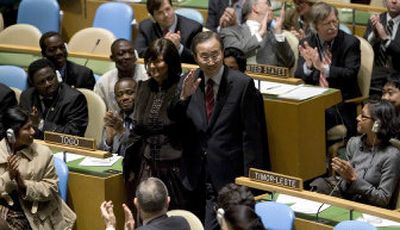South Korean to lead U.N.

UNITED NATIONS – The U.N. General Assembly appointed South Korean Foreign Minister Ban Ki-moon as the next U.N. secretary-general Friday, and the veteran diplomat who grew up during a war that divided his country pledged to make peace with North Korea a top priority.
The assembly’s action on Ban capped the remarkable rise of a man who was little known outside Asia before launching his campaign to succeed Kofi Annan. It also marked a milestone for South Korea, which only joined the United Nations in 1991 and still has U.N. troops on the tense border with the North.
Ban has been in the forefront of South Korea’s nuclear negotiations with Pyongyang and has said he plans to travel to North Korea as secretary-general, something Annan never did. He said last month he would use the authority of the U.N. position to promote peace and reconciliation on the Korean peninsula “and a peaceful resolution of the North Korean nuclear issue.”
In a speech to hundreds of diplomats and U.N. staff Friday, Ban laid out his vision for the United Nations, whose reputation has been tarnished by corruption scandals and whose outdated practices still need major reform to meet the challenges of the 21st century.
“My tenure will be marked by ceaseless efforts to build bridges and close divides,” he said. “Leadership of harmony not division, by example not instruction, has served me well so far. I intend to stay the course as secretary-general.”
Ban, 62, will become the eighth secretary-general in the U.N.’s 60-year history on Jan. 1 when Annan’s second five-year term expires. Ban was one of seven candidates vying to be the U.N. chief and topped all four informal polls in the Security Council.
He said he was proud to be the second Asian chosen to serve as secretary-general. The last secretary-general from the continent was Burma’s U Thant, who served from 1961-71.
By tradition, the post of secretary-general rotates among the regions of the world and most countries agreed that this time it was Asia’s turn.
Hundreds of diplomats and U.N. staff in the chamber broke into loud applause when assembly President Sheikha Haya Rashed Al Khalifa asked the 192-nation world body to adopt the resolution appointing Ban by acclamation. She then banged the gavel and said, “It is so decided.”
Annan hailed Ban as “a future secretary-general who is exceptionally attuned to the sensitivities of countries and constituencies in every continent” and said he would be “a man with a truly global mind at the helm of the world’s only universal organization.”
Annan recalled that the first U.N. secretary-general, Trygvie Lie, told his successor, Dag Hammarskjold, “You are about to take over the most impossible job on Earth.”
“While that may be true,” Annan said, “I would say: This is also the best possible job on Earth.”
U.S. Ambassador John Bolton said Ban is “the right person to lead the United Nations at this decisive movement in its history, particularly as the U.N. struggles to fulfill the terms of the reform agenda that world leaders agreed to last fall.”